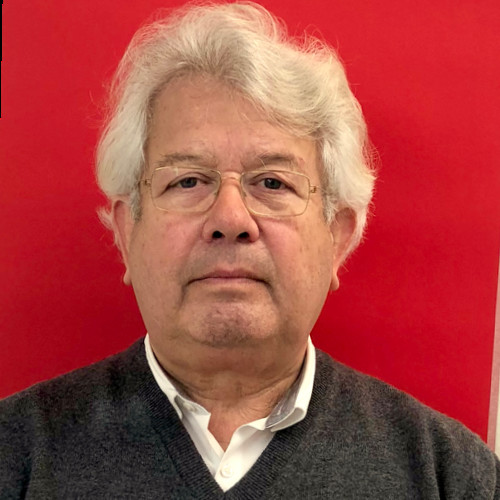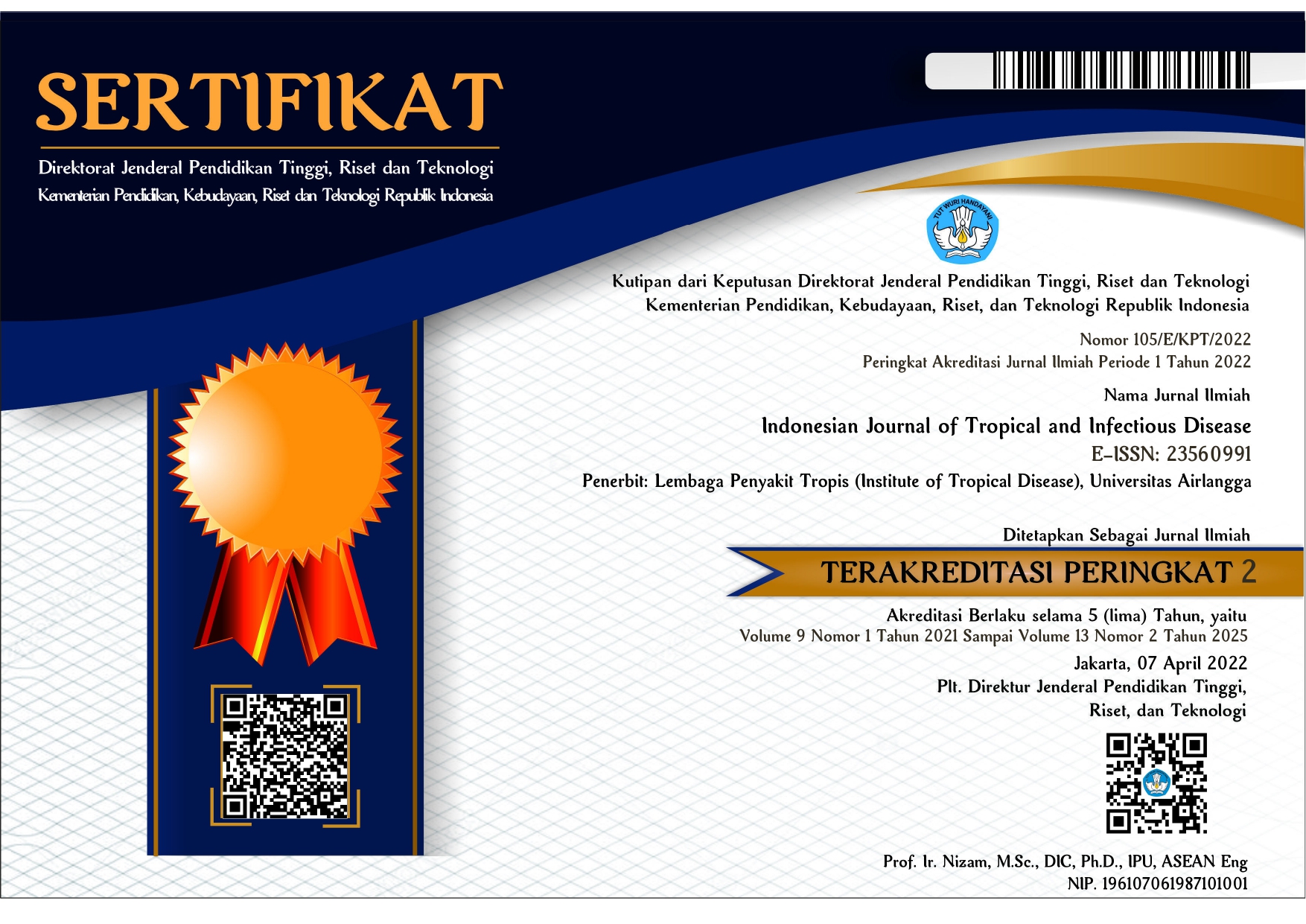CLINICAL MANIFESTATION APPROACH OF DENGUE VIRAL INFECTION
Downloads
Currently by an estimated 50-100 million dengue fever cases per year in worldwide, 500.000 were in the form of a disease is heavy Dengue Hemorraghic Fever (DHF) and Dengue Shock Syndrome (DSS). Survey serology in Indonesia show that DEN-1 and DEN-2 are the dominant serotipe virus until the end of the 1980s but the recent shift has occurred epizoötic where viruses DEN-3 dominant. (Dos Santos, 2004; Malavige, 2004; Stephenson, 2005). Dengue virus infection induces transient immune aberrant activation of CD4/CD8 ratio inversion and cytokine overproduction, and infection of endothelial cells and hepatocytes causes apoptosis and dysfunction of these cells. The aberrant immune responses not only impaire the immune response to clear the virus, but also result in overproduction of cytokines that affect monocytes, endothelial cells, and hepatocytes. Dengue-virus-induced vasculopathy and coagulopathy must be involved in the pathogenesis of hemorrhage, and the unbalace between coagulation and fibrinolysis activation, and prolonged duration of shock increase the likelihood of severe hemorrhage in DHF/DSS. Capillary leakage is triggered by the dengue virus itself or by antibodies to its antigen. To date, there are no effective strategies to prevent the progression of DHF/DSS. The control of dengue will be possible only after an efficient vaccine has been developed.
Lei HY, Yeh TM, Liu HS, Lin YS, Chen SH, Liu CC, (2001). Immunopathogenesis of dengue virus infection. J. Biomed. Sci. (8): 377–388.
Dos Santos FB, Miagostovich MP, Nogueira RMR, Schatzmayr HG, Riley LW, Harris E (2004). Analysis of recombinant dengue virus polypeptides for dengue diagnosis and
Malavige GN, Fernando S, Fernando DJ, Seneviratne SL, (2004). Dengue viral infections. Postgrad. Med. J. (80): 588–601.
Stephenson JR, (2005). Understanding dengue pathogenesis: implications for dengue vaccine design. Bulletin of the World Health Organization, 83(4), pp. 308–314.
Kosasih H, Tan RI, Porter KR, Beckett CG, Alisjahbana B, Rudiman PJF, et al (2005). Epidemiology of dengue and dengue hemorrhagic fever in a cohort of adult living in Bandung, West Java, Indonesia. Am. J. Trop. Med. Hyg. 72(1): 60–66.
Wilder-Smith A, Schwartz E (2005). Current concepts: dengue in travelers. N. Engl. J. Med. 353: 924–32.
Rothman AL, (2004). Dengue: defining protective versus pathologic immunity. J. Clin. Invest. 113(7), pp. 946–951.
Nimmannitya S (2003). Dengue and dengue hemorrhagic fever. In: Cook G, Zumla A (Eds.). Manson's Tropical Diseases, 21st ed. RDC Group, China, pp. 765–772.
Baratawidjaya KG, (2002). Imunitas terhadap virus. Dalam: Imunologi dasar, 5th ed. Balai Penerbit FKUI, Jakarta, hal. 198–202.
Pichyangkul S, Endy TP, Kalanayarooj S, Nisalak A, Yongvanitchit S, Green S, et al (2003). A blunted blood plasmacytoid dendritic cell response to an acute systemic viral infection is associated with increased disease severity. Journal of Immunology, (22): 5571–78.
Halstead S (2005). Host response to dengue infection. In: Dengue digest. MICA(P)(2):2.
Bray M, (2005). Pathogenesis of viral hemorrhagic fever. Current Opinion In Immunology 17: 399–403.
Shu PY, Huang JH, (2004). Current advances in dengue diagnosis. Clin. Diagn. Lab. Immunol. 11(4): 642–8.
Sheperd S, (2005). Dengue fever. Eds: Wood MJ, et al. Available on:
http://www.Emedicine.com. Accesed on January 5th, 2006.
Lei HY (2005). Thrombocytopenia and vascular leakage. Dengue
digest. MICA(P)(2):2.
Liu JW, Khor BS, Lee CH, Lee IK, Chen RF, Yang KD, (2003). Dengue hemorrhagic fever in Taiwan. Dengue Bulletin 27, 19–24.
Peters CJ (2005). Infection caused by arthropod and rodent-borne viruses. In: Fauci AS, Braunwald E, Isselbacher KJ (Eds.). Harrison's Principles of Internal Medicine, 16th ed. Mc Graw Hill, New York, pp. 1132–54.
Simmons CP, Dong T, Chau NV, Dung NTP, Chau TNB, Thao LTT, et al (2005). Early T-cell responses to dengue virus epitopes in Vietnamese adult with secondary dengue virus infections. Journal of Virology 79(9): 5665–75.
Guzman MG, Kourf G (2002). Reviews, Dengue: an update. The Lancet Inf. Dis. 2(1):1-8.
See Lum LC, Golt AYT, Chan PWK, El-Amin ALM, Lam SK, (2002). Risk factors for hemorrhage in severe dengue infections. Journal of Pediatrics, 140(5), pp. 1–3.
The Indonesian Journal of Tropical and Infectious Disease (IJTID) is a scientific peer-reviewed journal freely available to be accessed, downloaded, and used for research. All articles published in the IJTID are licensed under the Creative Commons Attribution-NonCommercial-ShareAlike 4.0 International License, which is under the following terms:
Attribution ” You must give appropriate credit, link to the license, and indicate if changes were made. You may do so reasonably, but not in any way that suggests the licensor endorses you or your use.
NonCommercial ” You may not use the material for commercial purposes.
ShareAlike ” If you remix, transform, or build upon the material, you must distribute your contributions under the same license as the original.
No additional restrictions ” You may not apply legal terms or technological measures that legally restrict others from doing anything the license permits.























